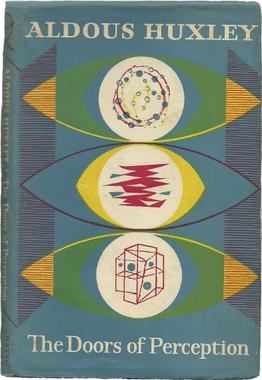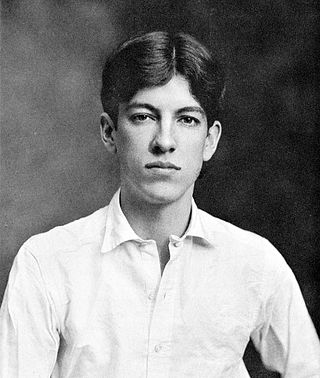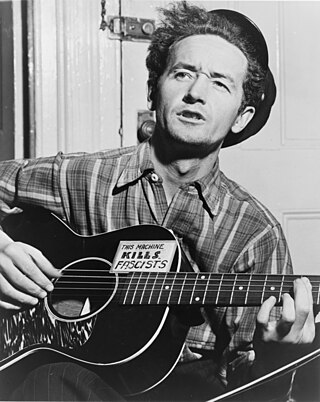Related Research Articles

Aldous Leonard Huxley was an English writer and philosopher. His bibliography spans nearly 50 books, including novels and non-fiction works, as well as essays, narratives, and poems.

The Doors of Perception is an autobiographical book written by Aldous Huxley. Published in 1954, it elaborates on his psychedelic experience under the influence of mescaline in May 1953. Huxley recalls the insights he experienced, ranging from the "purely aesthetic" to "sacramental vision", and reflects on their philosophical and psychological implications. In 1956, he published Heaven and Hell, another essay which elaborates these reflections further. The two works have since often been published together as one book; the title of both comes from William Blake's 1793 book The Marriage of Heaven and Hell.

Peter Seeger was an American folk singer and social activist. A fixture on nationwide radio in the 1940s, Seeger also had a string of hit records during the early 1950s as a member of the Weavers, notably their recording of Lead Belly's "Goodnight, Irene," which topped the charts for 13 weeks in 1950. Members of the Weavers were blacklisted during the McCarthy Era. In the 1960s, Seeger re-emerged on the public scene as a prominent singer of protest music in support of international disarmament, civil rights, counterculture, workers' rights, and environmental causes.

"We Shall Overcome" is a gospel song which became a protest song and a key anthem of the American civil rights movement. The song is most commonly attributed as being lyrically descended from "I'll Overcome Some Day", a hymn by Charles Albert Tindley that was first published in 1901.

Charles Louis Seeger Jr. was an American musicologist, composer, teacher, and folklorist. He was the father of the American folk singers Pete Seeger (1919–2014), Peggy Seeger, and Mike Seeger (1933–2009); and brother of the World War I poet Alan Seeger (1888–1916) and children's author and educator Elizabeth Seeger (1889-1973).
Industrial folk music, industrial folk song, industrial work song or working song is a subgenre of folk or traditional music that developed from the 18th century, particularly in Britain and North America, with songs dealing with the lives and experiences of industrial workers. The origins of industrial folk song are in the British industrial revolution of the eighteenth century as workers tended to take the forms of music with which they were familiar, including ballads and agricultural work songs, and adapt them to their new experiences and circumstances. They also developed in France and the US as these countries began to industrialise.
"How Can I Keep From Singing?" is an American folksong originating as a Christian hymn. The author of the lyrics was known only as 'Pauline T', and the original tune was composed by American Baptist minister Robert Lowry. The song is frequently, though erroneously, cited as a traditional Quaker or Shaker hymn. The original composition has now entered into the public domain, and appears in several hymnals and song collections, both in its original form and with a revised text that omits most of the explicitly Christian content and adds a verse about solidarity in the face of oppression. Though it was not originally a Quaker hymn, Quakers adopted it as their own in the twentieth century and use it widely today.

Alan Seeger was an American war poet who fought and died in World War I during the Battle of the Somme, serving in the French Foreign Legion. Seeger was the brother of Elizabeth Seeger, a children's author and educator, and Charles Seeger, a noted American pacifist and musicologist; he was also the uncle of folk musicians Pete Seeger, Peggy Seeger, and Mike Seeger. He is lauded for the poem "I Have a Rendezvous with Death", a favorite of President John F. Kennedy. A statue representing him is on the monument in the Place des États-Unis, Paris, honoring fallen Americans who volunteered for France during the war. Seeger is sometimes called the "American Rupert Brooke".

"Where Have All the Flowers Gone?" is a folk song written by American singer-songwriter Pete Seeger in 1955. Inspired lyrically by the traditional Cossack folk song "Koloda-Duda", Seeger borrowed an Irish melody for the music, and published the first three verses in Sing Out! magazine. Additional verses were added in May 1960 by Joe Hickerson, who turned it into a circular song. Its rhetorical "where?" and meditation on death place the song in the ubi sunt tradition. In 2010, the New Statesman listed it as one of the "Top 20 Political Songs".

The American folk music revival began during the 1940s and peaked in popularity in the mid-1960s. Its roots went earlier, and performers like Josh White, Burl Ives, Woody Guthrie, Lead Belly, Big Bill Broonzy, Richard Dyer-Bennet, Oscar Brand, Jean Ritchie, John Jacob Niles, Susan Reed, Paul Robeson, Bessie Smith, Ma Rainey and Cisco Houston had enjoyed a limited general popularity in the 1930s and 1940s. The revival brought forward styles of American folk music that had in earlier times contributed to the development of country and western, blues, jazz, and rock and roll music.

Tao Rodríguez-Seeger is an American contemporary folk musician. A founder of The Mammals, he is the grandson of folk musician Pete Seeger. He plays banjo, guitar, harmonica and sings in English and Spanish.

We Are Climbing Jacob's Ladder is an African American slave spiritual based in part on the Biblical story of Jacob's Ladder. It was developed some time before 1825, and became one of the first slave spirituals to be widely sung by white Christians. A number of artists have recorded notable versions of it, and it was used as one of the main themes in the critically praised documentary The Civil War.

Oscar Brand was a Canadian-born American folk singer-songwriter, radio host, and author. In his career, spanning 70 years, he composed at least 300 songs and released nearly 100 albums, among them Canadian and American patriotic songs. Brand's music ran the gamut from novelty songs to serious social commentary and spanned a number of genres.

College Concert is the twelfth album by the American folk music group the Kingston Trio, released in 1962. It was the group's third live release and the first live release with new member John Stewart. College Concert peaked at number three on the Billboard charts and was the largest-selling release by the Stewart-years Trio.

Vern Partlow was an American newspaper reporter and folk singer who was blacklisted during the McCarthy era. He composed the popular satirical song "Old Man Atom," which was famously banned during the period. It is considered one of the first anti-nuclear songs of the post-war era.

The discography of Pete Seeger, an American folk singer, consists of 52 studio albums, 23 compilation albums, 22 live albums, and 31 singles. Seeger's musical career started in 1940 when he joined The Almanac Singers. He stayed with the group for two years until he was drafted into the Army to fight in the Second World War. After the end of World War II in 1945, Seeger helped found an organization known as People's Songs, along with the influential folk music magazine People's Songs Bulletin. He published several singles and a studio album with the magazine. Seeger would play at People's Songs events, called hootenannies, until the organization folded in 1949. After People's Songs, Seeger and another former member of the Almanacs, Lee Hays, founded the Weavers, who achieved commercial success. In 1952, The Weavers went on hiatus due to the Red Scare; Seeger and Hays both had Communist ties. After the demise of the Weavers, Seeger released a solo album, American Folk Songs for Children, in 1953 on Folkways Records. He continued to release albums on Folkways until he signed with Capitol in 1961.
"Talking Union" is a talking blues song written by members of the Almanac Singers. The song tells of the common struggles that a union organizer faces while starting a new labor union. The song helped name the record album Talking Union & Other Union Songs.
Anthony D. "Tony" Saletan is an American folk singer, children's instructional television pioneer, and music educator, who is responsible for the modern rediscovery, in the mid-1950s, of two of the genre's best-known songs, "Michael Row the Boat Ashore" and "Kumbaya". In 1955, he was the first performer to appear on Boston's educational television station, WGBH. In 1969, Saletan was the first musical guest to appear on Sesame Street.

The following bibliography of Aldous Huxley provides a chronological list of the published works of English writer Aldous Huxley (1894–1963). It includes his fiction and non-fiction, both published during his lifetime and posthumously.
References
- ↑ "Professor Guerra wins national awards for UCSF, SF Giants videos" SFSU News. Retrieved 2018-05-31.
- ↑ Huntsberger, Michael W. (6 May 2010). "Dunaway, Pete Seeger—How Can I Keep From Singing? [audio documentary series review]". Journal of Radio & Audio Media. 17 (1): 129–130. doi:10.1080/19376521003733459. ISSN 1937-6529. S2CID 143326751.